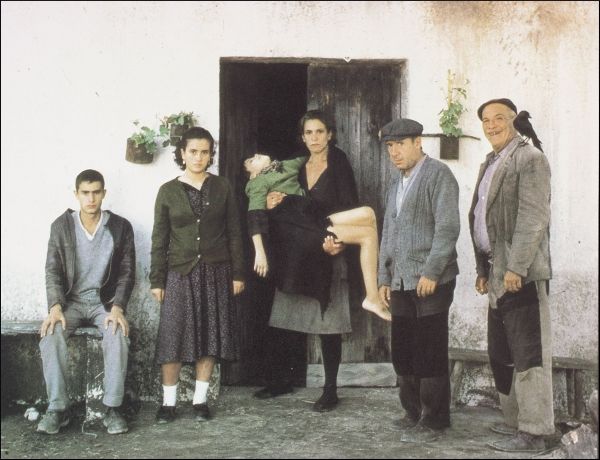Now a classic of Spanish cinema, Los santos inocentes (The Holy Innocents) is directed by Mario Camus and based on the popular novel of the same name by Miguel Delibes. Set in the countryside during the 60s and 70s, it portrays the lives of a family of peasants that works for higher class cottage-owners. Paco, the “short one” (played by the popular and brilliant Alfredo Landa), is the head of the family. He follows his boss, Mr. Iván (Juan Diego), like a hunting dog. In fact, he goes with him to every hunt that they organize, since he has served him and his family as far back as he can remember. Paco’s wife, Régula (Terele Pávez), dreams of giving her older children, Quirce and Nieves, a better education. Since the family has moved away from their miserable country house and into a small home near their masters, both parents expect that their children will be able to go to the nearest school. However, their masters have different plans for them, especially for the daughter, who they would wish to have in their big house as a maid.
When Régulas brother Azarias (performed by the popular Paco Rabal) is fired (he has mental problems and unhygienic habits), he moves in temporarily with his sister’s family. Shortly afterwards, Paco accidentally falls from a tree and breaks his leg. Since he now cannot participate in the hunts, Mr. Iván’s greatest passion, it is decided that Azarias will substitute him. Azarias has a domesticated bird that he loves, and one day, when the hunts goes wrong and not a single bird is killed, a frustrated Mr. Iván shoots Azarias’ bird. This results in a big tragedy.
"Los santos inocentes portrays the class differences that existed in Spain during General Franco’s dictatorship."
The title of the film is an allusion to the Biblical account of Herod’s murder of Bethlehem’s infants and is also a reference to the innocent peasants in the film who are unable to choose a better destiny, like Azarias, who is mentally handicapped and is therefore unable to understand that his behavior makes others suffer. Los santos inocentes portrays the class differences that existed in Spain during General Franco’s dictatorship. Throughout the movie, it is easy to observe how the peasants have to kneel down in front of their masters, who go out into the countryside with their rifles to have fun and hunt and leave the most disgusting and heavy tasks to the peasants without a thankful word. And, if they are merciful, it is only to keep the peasants happy and content. Lack of education and resources prevents peasants from choosing a better life for themselves, like when Régula wants her daughter to study but Paco’s boss prefers for her to help in his house, which Paco doesn’t oppose. Peasants have to resign themselves to the kind of life they have the bad luck to live.

While the older people are too servile, there is resistance from the younger generation. Quirce and Nieves refuse to take the extra money their boss gives them or don't perform their tasks eagerly. This is regarded as a “surprising rebellion” by the higher class. Like they say in the movie: “Nowadays young people have to be educated, it’s true, but they must know at all times that there is a superior class they must obey. There is a hierarchy, this is the law of life.” There are many signs of high class indifference to the peasants. For example, when Paco breaks his leg, his boss insists on having him participate in the next hunt two days later. He tells Paco to “be a man” and doesn’t care in the slightest whether he ends up lame for life.
"The novel was released in 1981 and the film in 1984. Delibes, the author of the book, was happy with Camus’ adaptation, in spite of the fact that they had to cut some scenes and eliminate certain characters."
Since the film is set in Extremadura, one might guess the accents are from this region. However, I think the actors didn’t put too much of an effort into imitating the accent, so that at certain points the film gives a sense of unreality (at least as far as the language is concerned). There is maybe some effort from Belén Ballesteros, who plays the daughter and who was chosen for the role because of her “melancholic glance,” and from Azarias, who has the most realistic accent. In fact, Paco Rabal worked not only on his accent (most of the things he says are difficult to understand) but on his look, as he spent several months living next to a real mentally handicapped man known as Barrunta. He went so far as to exchange clothes with him. But that’s it as far as accents are concerned. Some characters use some words that might reflect how countryside people speak, like when Paco says “chiquilín” to mean “small boy.”
The novel was released in 1981 and the film in 1984. Delibes, the author of the book, was happy with Camus’ adaptation, in spite of the fact that they had to cut some scenes and eliminate certain characters. But the message essentially came through. The soundtrack is especially remarkable and at times tragic. We can hear Extremadura’s folklore music and, during a certain point in the narrative, some people appear dancing the traditional “jota” from Extremadura.


